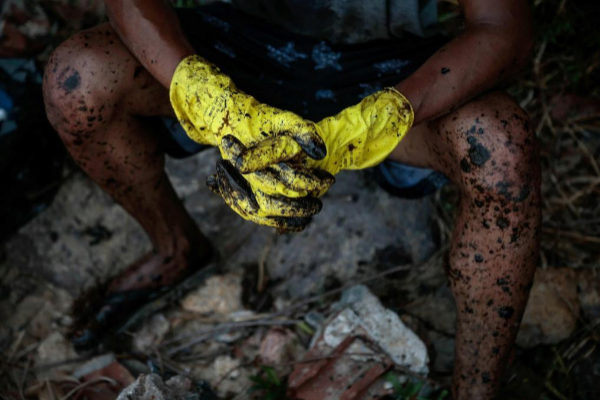- Brazil.The coast is filled with mysterious oil stains
The police ended Friday the mystery of the oil spill that has intrigued Brazil since the end of August. Hundreds of thousands of oil stains appeared (and still appear) on the beaches of the northeast coast of the country without knowing their origin. After weeks of investigation, the Federal Police concluded that the culprit of this new environmental catastrophe is a Greek-flagged ship, the Bouboulinha .
The ship docked in Venezuela on July 15, and three days later departed for Malaysia . The spill would have occurred between July 28 and 29. Thanks to geointelligence techniques and oceanographic calculations, it was possible to identify the only oil tanker that sailed in the area where the spill began, just over 700 kilometers off the coast of the Brazilian state of Paraíba .
The vessel has a capacity of almost 80,000 tons of oil , but it would have poured a lot less into the sea, around 2,500 . The Police have requested collaboration from five countries through Interpol to locate the ship's commander and their owners. The Bouboulina, which is theoretically now making a trip between Nigeria and Indonesia , has a murky record; In April he was held four days in the US for problems in a waste disposal filter.
"We have the place, the date and the sufficient indications of the authorship, now the details of the circumstances are missing. The investigation is still underway to know if it was an escape or a spill caused," said federal commissioner Agostinho Cascardo at a press conference .
The spill was first detected on August 30, and since then, the list of affected beaches has only increased. According to the latest count of the Brazilian Institute of Environment (Ibama), this Thursday, there are already 286 beaches in 97 municipalities in the nine states of northeastern Brazil.
The region is famous for its paradisiacal beaches of coconut trees, mangroves and coral reefs, and houses some of the best known beaches in the country. Jericoacoara, Praia do Forte, Morro de São Paulo, Praia dos Carneiros, or the Lençóis Maranhenses , among many others, have been affected by the spill in recent days to a greater or lesser extent. Last week, the Government timidly announced aid to the tourism sector, which is now just beginning the high summer season.
The specialists agree that the environmental impact is unprecedented. The situation, however, could get worse. The spots are increasingly reaching the south and it is feared that they will reach the Abrolhos archipelago , a very delicate ecosystem famous for its reefs and whale watching. This week, researchers from the Federal University of Rio de Janeiro (UFRJ) , based on images from the European Space Agency, warned that a spot of 200 square kilometers was heading to the coast of the state of Bahia . The Navy and the Ministry of Environment flatly denied it.
The confusion in the information is due, in part, to the composition of Venezuelan oil. According to specialists, it is of worse quality than that extracted in Brazil and does not float completely on the sea, but is mixed with water, which makes it difficult for spots to be detected through satellites.
The Government has rained criticism for its management of the crisis. Bolsonaro has not set foot on a beach since oil began to reach the coast and the Armed Forces mobilized weeks later. For many days, fuel collection work was led by fishermen and volunteers in most cases without the necessary tools or means of protection. Several of them have been hospitalized with symptoms derived from direct contact with oil. On October 18, the Prosecutor's Office accused the Government of being "ignored, inefficient and ineffective," and forced him to activate an emergency plan within 24 hours, under threat of a daily fine of one million reais.
Given the criticism of environmental organizations, the Minister of the Environment, Ricardo Salles , chose to warm up the mood even more by suggesting that the spill was a sabotage by Greenpeace : "There are coincidences in life, right? ... It seems that the Greenpeace ship was just sailing in international waters, in front of the Brazilian coast, just at the time of the Venezuelan oil spill ... ", the minister wrote on Twitter next to a photo of the Esperanza ship of the international organization.
This Thursday, the Secretary of Aquaculture and Fisheries of the Government, Jorge Seif Júnior , wanted to reassure the population in a video with Bolsonaro saying: "The fish is an intelligent animal. When it sees an oil stain, captain, flees, has fear. So, obviously, they can consume their fish without any problem. Lobsters, ranges ... all perfectly healthy. "
According to the criteria of The Trust Project
Know more- Brazil
- science
- Science and Health
AmbienteMatt McGrath of the BBC, awarded by the FBBVA for informing and "inspiring" about the challenges of the planet
ScienceChamber of autumn time 2019: When does the new schedule enter Spain?
ScienceThe genetic secret of craft beers

